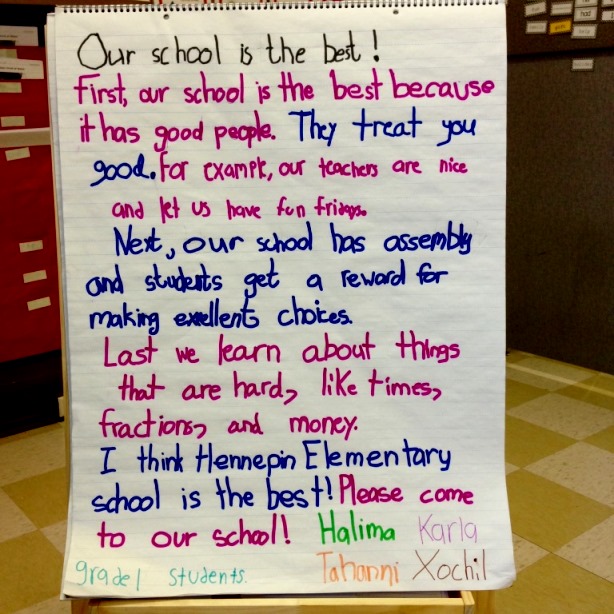Our Approach
Hennepin Elementary School (HES), a public charter elementary school, opened in August 2012. HES is enrolling students in grades Kindergarten through 7th grade in 2018-19 and will be K-8 beginning in the 2019-20 school year.

Our flagship school, Hennepin Elementary School, is located three blocks from the Children's Theatre and the Minneapolis Institute of Arts and one block from Washburn Fair Oaks Park.
And our newly designed Hennepin Middle School is located in the East Nokomis neighborhood.
There are no shortcuts to academic success and no excuses for failing to achieve it. Hennepin Schools develops a school culture that includes these features:
- Extended school day (8:45am - 4:15 pm)
- All Day Kindergarten
- Saturday School
- Summer School
- School uniforms
- Single gender options
- Small class sizes
- Double sessions of reading and math on a daily basis
- Physical activity every day
- Free transportation
- Breakfast, lunch, and snacks are provided
Our Commitment
We are relentlessly committed to student achievement. We know that all students can and must achieve. Our expectations are high, our desire for success is intense and our timeline is aggressive. We use clear and concrete measures to determine achievement. When we fail, we take responsibility and look to develop better and more effective methods. We constantly explore new strategies to increase our effectiveness and we never embrace pedagogical fads or ideologies. We know that high expectations must be matched by high and efficient levels of support. We are united by our shared mission, by the urgency of the calling, and by our relentless pursuit of academic achievement for all.
Overview

Hennepin Schools integrate modern management and effective educational practices to drive student achievement. Our program is distinct in several ways. Most importantly, our teachers are outstanding and relentlessly committed to student achievement. Instruction at Hennepin Schools means teaching and supporting students until they learn. Our teachers continually improve their craft through frequent feedback, coaching, and collaborative support. Instruction is grounded by a common pedagogical model and guided by focused standards-based curricula. We align assessments to clear objectives and use assessment data to direct instruction. We utilize a mastery-based grading system and a scaffolded course structure that addresses students at their incoming skill level, yet holds all students to a single college preparatory graduation standard.
Sweating The Small Stuff
Hennepin Schools create an achievement-focused school culture by sweating the small stuff while fostering meaningful, personalized relationships between students and adults. To support the transition to a high expectations culture, we explicitly teach students problem-solving and social-emotional skills. Hennepin Schools insist on high expectations and high support so all students can achieve success.
The Instructional Standards
Hennepin Schools’ instructional model is grounded in a common framework referred to as the Instructional Standards. The Instructional Standards are a compilation of fundamental core content, best teaching practices, successful teacher traits and common measures of student success. Each content standard is designed to create an objective-driven, rigorous and effective classroom experience that will serve to prepare students for higher education, the global economy and the pursuit of their dreams. The standards provide a common language and expectation used to facilitate peer and administrative observations as well as coaching and professional development. At the student level, the standards serve to create a common instructional experience across classes by instituting valuable rituals and strategies.
The School Cycle
Hennepin Schools Instruction and Assessment Cycle is a workflow that ensures instructional time targets new material as well as addresses deficits. The cycle helps ensure that struggling students are identified and receive the supports they need to be successful. The cycle is comprised of four components: a) Planning, b) Teaching, c) Assessment, and d) Analysis. The cycle plays out in multiple arenas. At the school level, data supports the design of intervention programming. Most importantly, at the teacher level, unit and lesson plans and individualized supports are influenced by the data and frequent checks for understanding.
